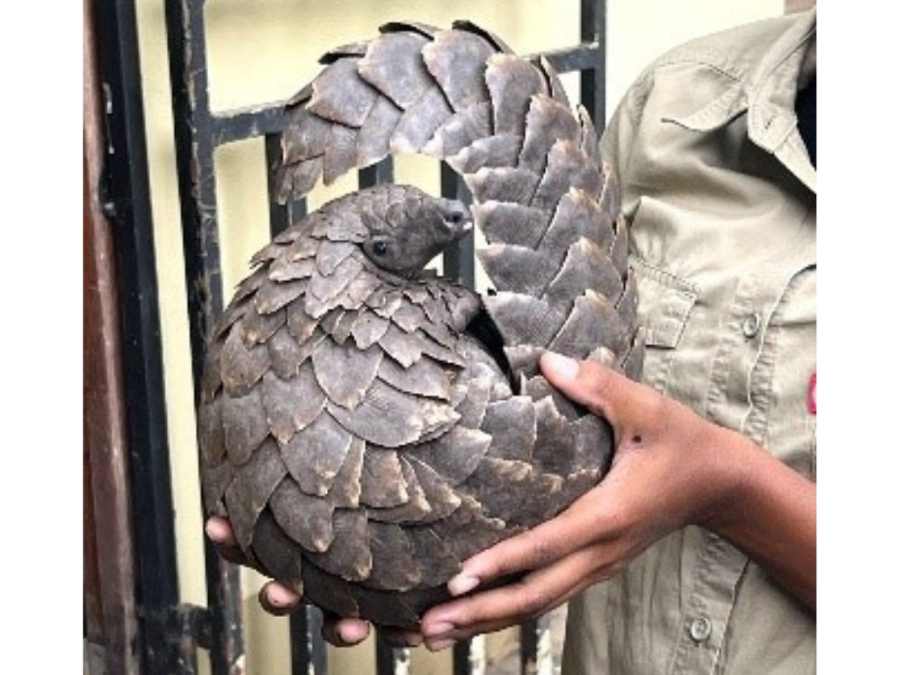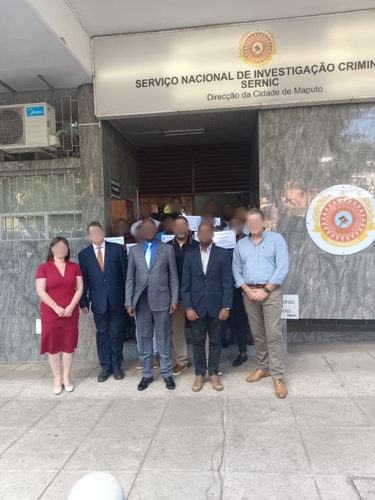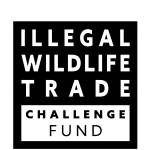Strengthening law enforcement capacity

Captive pangolin, taken at Gorongosa national park. Credit - Paul Owens, WJC mentor.
Strengthening law enforcement capacity to fight wildlife crime in Mozambique
Criminal networks based in Mozambique have been identified as playing a significant role in the poaching and trafficking of wildlife in the Great Limpopo Transfrontier Conservation Area (GLTFCA), spanning parts of Mozambique, South Africa, and Zimbabwe. Mozambique is a major exit point out of Africa for ivory and rhino horn being shipped to Asia.
The Wildlife Justice Commission works to support law enforcement to disrupt and help dismantle transnational organised criminal networks trafficking in wildlife, timber, and marine products. They do this by conducting intelligence-led investigations in support of their law enforcement partners; sharing intelligence and current criminal landscape dynamics with law enforcement and policy makers; providing operational and technical support through joint operations, training and mentoring with their law enforcement partners; and influencing policy and building the political will to address wildlife crime.
Over the past five years, the Wildlife Justice Commission has built a strong relationship with SERNIC, Mozambique’s National Criminal Investigation Service. SERNIC is the law enforcement agency in Mozambique mandated to tackle serious organised crime, and plays a key role in disrupting transnational organised wildlife crime.
"Park and enforcement managers delivered presentations into wildlife trafficking trends, threats, product identification, and emerging criminal trends which included showcasing seized wildlife products, firearms, and traps used in the poaching of animals."
Through their IWT Challenge Fund project, the Wildlife Justice Commission has been able to further support SERNIC through targeted training and mentoring in intelligence analysis and investigations to enhance their capabilities to address IWT. Based on a needs assessment, past operational experience, and consultations with SERNIC, the Wildlife Justice Commission designed a training and mentoring programme that would build sustainable capacity in Mozambique through “Train the Trainer” courses and expand training beyond Maputo (City and Province) to include other units in the strategically important Sofala and Nampula provinces.
From 16 January to 02 February, 2024, the Wildlife Justice Commission conducted a “Train the Trainer” course in Maputo for participants from Maputo, Sofala, and Nampula provinces. The focus was on providing practical knowledge in intelligence analysis and proactive investigations to SERNIC trainers, enabling them to train other SERNIC officers in these critical subjects.
After the “Train the Trainer” course was completed in Maputo, SERNIC trainers, with support from Wildlife Justice Commission experts, conducted a series of trainings to SERNIC officers in each of the target provinces. In May, two weeks of training and mentoring were conducted for SERNIC Officers from Sofala Province, and from Maputo City and Province; and in June, two weeks of training and mentoring were held for SERNIC Officers from Nampula province.
"These courses served to build the confidence of newly trained trainers and provided them with the knowledge and skills to continue in their important role of training other officers."
SERNIC trainers provided participants with sessions focused on providing investigators with the skills, techniques, and procedures to effectively conduct intelligence-driven proactive investigations and operations compatible with Mozambique legislation and fundamental human rights principles. These courses also served to build the confidence of the newly trained trainers and provided them with the knowledge and skills to continue in their important role of training other officers in the use of intelligence to proactively target those engaged in criminality impacting Mozambique. In total, 120 SERNIC officers were trained and mentored.
Mentoring of SERNIC officers included a combination of practical exercises carried out on site in their respective provinces, at relevant ports, and/or National Parks. For example, the final mentoring week in Sofala Province included practical mentoring sessions at Beira International Airport, where Wildlife Justice Commission experts observed and provided guidance to SERNIC staff conducting an intelligence-led proactive operation profiling passengers arriving on an international flight. This operation resulted in the detention of eight individuals with non-declared wildlife and smuggled goods, including 100 kg of live worms. Additionally, further insights into wildlife trafficking were provided through informative presentations at Gorongosa National Park. Wildlife Justice Commission mentors, accompanied by SERNIC trainers, facilitated these visits with the National Administration of Conservation Areas .
Park and enforcement managers delivered presentations into wildlife trafficking trends, threats, product identification, and emerging criminal trends which included showcasing seized wildlife products, firearms, and traps used for poaching of animals. The park vet showcased a live pangolin and explained the care provided to the 125 pangolins rescued from poachers. Officers then had the opportunity to see native wildlife in the bush. For many of them, it was the first time they had seen live animals, which gave them a greater determination to combat wildlife crime.

Additionally, as the role of women is generally underappreciated within law enforcement communities, the project also aimed to increase the participation of female officers in the trainings. In total, 15% of the participants were female, which was an increase over previous trainings. The Wildlife Justice Commission has strong female representation internally, with nearly 90% of its intelligence analysts being female and substantial use of female undercover operatives which was highlighted during the trainings.
An Information Sharing workshop was held in Maputo on 24 and 25 July 2024, with representatives from South African and Mozambican law enforcement agencies with a mandate to address serious transnational organised crime, including wildlife crime. The workshop aimed to discuss the best way to facilitate information sharing between the two countries and to identify crime convergence with wildlife crime actors and other types of serious organised crime including drug trafficking, kidnappings, organised motor vehicle theft, and firearms trafficking. The meeting was extremely successful and a follow up meeting between the two countries has been scheduled for November 2024.
"This initiative is based on the understanding that women’s roles and leadership, particularly in resource management and food security, are pivotal to community resilience and biodiversity conservation."The project also seeks to counter wildlife crime in Mozambique by empowering women in local communities through gainful employment, including relevant training and technical assistance, through their partner Peace Parks Foundation. They have selected, trained, and equipped 35 female community members to carry out eco-jobs. This initiative is based on the understanding that women’s roles and leadership, particularly in resource management and food security, are pivotal to community resilience and biodiversity conservation.
This project is part of the broader efforts of the Wildlife Justice Commission to support governments, like that of Mozambique, to build their capacity in investigating and prosecuting wildlife crime in order to disrupt and dismantle the criminal networks plundering our planet’s wildlife for profit.
For more information on this IWT Challenge Fund Main project IWT124, led by Wildlife Justice Commission, please click here.

 Back
Back